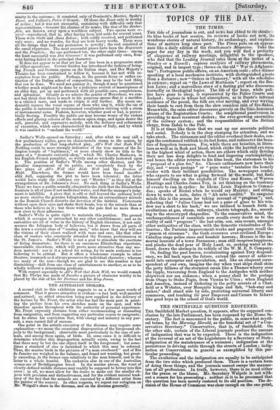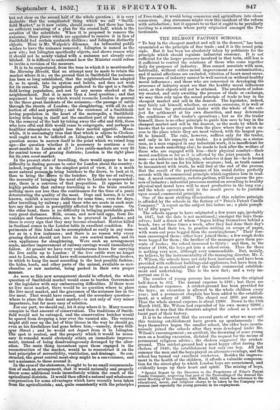THE SMITHFIELD QUESTION REOPENED.
TH:E Smithfield Market question, it appears, after its supposed con- clusion by the late Parliament, has been reopened by the HomeSe- cretary. The fact is announced to the public, in somewhat mysti- cal terms, by the Morning Herald, as the beneficial act of " a Con- servative Secretary." Conservative, that is, of Smithfield. On the other side, certain of the Liberal journals produce the amount of indignation that was to be expected. There is the indignation at the reversal of an act of the Legislature by a Secretary of State ; indignation at the maintenance of a nuisance ; indignation at the persistence in driving cattle through the streets of London ; indig- nation at Conservatism in general as exemplified by this par- ticular proceeding. The exultation and the indignation are equally to be anticipated from the two sides which produced them. There is a certain form of doing these things, and the journals cannot escape the manner- ism of all professions. In truth, however, there is no need either for the praise or the blame. Mr. Secretary Walpole is not with- out a reason for his proceeding ; neither is it to be presumed that the question has been merely restored to its old position. The de- cision of the House of Commons was clear enough on the one point,
but not clear on the second half of the whole question : it is very desirable that the complicated thing which we call "Smith- field Market," as it now exists, should cease ; but there has been no sufficient maturing of a plan for the second half, which is the creation of the substitute. When it is proposed to remove the nuisance, those places which are appointed to receive it in lien of Smithfield feel certain qualmish dislikes ; and Islington distinctly objects. Here is Mr. Walpole's dilemma. An influential public wishes to have the nuisance removed ; Islington is named as the new site ; but Islington specifically objects, and shows reason why it should not be newly visited with a nuisance not already esta- blished. It is difficult to understand how the Minister could refuse to invite a revision of the measure.
It is to be conjectured, from the tone in which it is mentionedby the Morning Herald, that an attempt may be made to retain the market where it is ; on the ground that in Smithfield the nuisance has been so long established, that the neighbourhood has adopted it, so to speak, into its system and habits, and does not wish for its removal. The population gathered to the spot is a Smith- field•loving population, and•not by any means shocked at the neighbourhood. But it is more than a local question ; and that argument is hardly one which would reconcile London in general to the three great incidents of the nuisance,—the passage of cattle through the streets of London; the slaughtering, with all its col- lection of offal and putridity ; and the existence of a Smithfield- loving population in the heart of the metropolis, a Smithfield- loving tribe being in itself not the smallest part of the nuisance. On the removal of the bait by taking away the offal and filth, those who love offal and filth would cease to congregate, and perhaps in healthier atmospheres might lose their morbid appetite. Mean- while, it is unceasingly true that that which is odious to Clerken- well ought not to be inflicted on Islington; and the substantial question seems to narrow itself to the point which we raised long ago—the question whether it is necessary to continue a live meat-market in London at all ? Live cattle-markets are very fit for central towns of grazing districts ; London is the right place for its own meat-market.
In the present state of travelling, there would appear to be no difficulty in finding persons to eater for London about the country : indeed, regarding it in the simplest point of view, it is a much more natural processjo bring butchers to the drove, to look at it, than to bring the dove to the butcher. By the use of railway, the necessity of bringing the meat alive to London is superseded; nay, there is a converse of that proposition. It appears to be highly probable that railway travelling is to the brute creation nothing more nor less than the continuance for the time of a panic deteriorating the quality of the meat. Dogs and horses, it is well known, exhibit a nervous dullness for some time, even for days, after travelling by railway ; and those who are acute in such mat- ters say that meat is perceptibly affected by the same cause. On the other hand, there is no difficulty in bringing.perishable goods very great distances. Milk, cream, and new-laid eggs, from De- vonshire and Somersetshire, are to be procured in London ; and there is every sign that they may become abundant. Mutton killed in Scotland comes to the London table in excellent condition. Ex- periments of this kind can be accomplished as easily in any num- ber as in a few instances ; and there is no reason why every grazing district should not have its own central market, and its own appliances for slaughtering. Were such an arrangement made, another improvement of railway carriage would immediately follow. At present we have very cumbersome boxes for carrying the live cattle up to London : if the live cattle were no longer sent to London, we should have well-constructed travelling larders, in which to hang the meat according to the best possible fashion ; the hides, hoofs, and other parts of the animal, available as mer- chandise or raw material, being packed in their own proper manner.
As soon as this new arrangement should be effected, the whole question of Smithfield market would cease to burden Government or the legislator with any embarrassing difficulties. If there were no live meat market, there would be no question where to place the live meat market, and the gravamen of the nuisance lies in the live meat. That would have ceased, and the secondary question— where to place the dead meat market—is not only of very minor importance, but far more easy of solution. For our part, we should say, let it stop where it is. Many reasons
conspire to that amount of conservatism. The traditions of Smith- field would not be outraged, and the conservative butcher would be spared from dropping a tear over the vacated site. The veteran might still rear up the lad of blue blouse in the way he should go, even as his forefathers had gone before him,—namely, down Gilt- spur Street ; and he would not depart from it to Islington. The spot is central, and the property which it would be neces- sary to remodel would obviously attain an immediate improve- ment, instead of being disadvantageously deranged by the alter- ation. The main thing incumbent upon those engaged in the reconstruction of the market, would be to reconstruct it on the best principles of accessibility, ventilation, and drainage. So con- structed, the great central meat-shop might be a convenience, and not a nuisance, to those around it.
In the eyes of the statesman, it ought to be no small recommenda- tion of such an arrangement, that it would naturally and properly throw some additional trade immediately within the reach of the agricultural districts. It would then afford a natural and wholesome compensation for some advantages which have recently been taken from the agriculturists ; and, quite consistently with the principles of Free-trade, it would bring commerce and agriculture into closer connexion. Any statesman might view this incident of the reform with satisfaction ; but it appears to us that it ought to be peculiarly inviting to a statesman whose party originated amongst the Pro- tectionists.



























 Previous page
Previous page